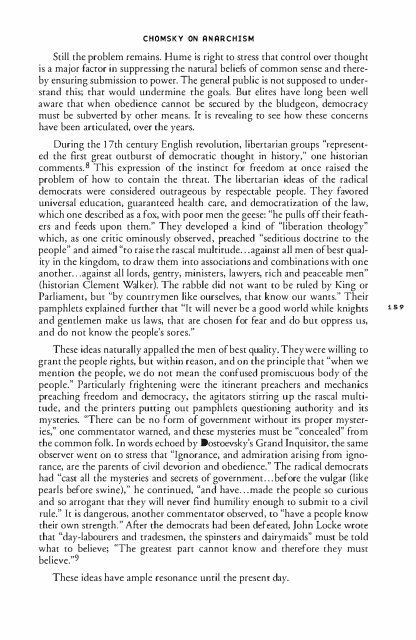Chomsky on Anarchism.pdf - Zine Library
Chomsky on Anarchism.pdf - Zine Library
Chomsky on Anarchism.pdf - Zine Library
You also want an ePaper? Increase the reach of your titles
YUMPU automatically turns print PDFs into web optimized ePapers that Google loves.
CHOMSKY ON ANARCHISM<br />
Still the problem remains. Hume is right to stress that comrol over thought<br />
is a major factor in suppressing the natural beliefs of comm<strong>on</strong> sense and thereby<br />
ensuring submissi<strong>on</strong> to power. The general public is not supposed to understand<br />
this; that would undermine the goals. But elites have l<strong>on</strong>g been well<br />
aware that when obedience cannot be secured by the bludge<strong>on</strong>, democracy<br />
must be subverted by other means. It is revealing to see how these c<strong>on</strong>cerns<br />
have been articulated, over the years.<br />
During the 17th century English revolmi<strong>on</strong>, libertarian groups "represented<br />
the first great outburst of democratic thought in history," <strong>on</strong>e historian<br />
comments.8 This expressi<strong>on</strong> of the instinct for freedom at <strong>on</strong>ce raised the<br />
problem of how to c<strong>on</strong>tain the threat. The libertarian ideas of the radical<br />
democrats were c<strong>on</strong>sidered outrageous by respectable people. They favored<br />
universal educati<strong>on</strong>, guaranteed health care, and democratizati<strong>on</strong> of the law,<br />
which <strong>on</strong>e described as a fox, with poor men (he geese: "he pulls off their feathers<br />
and feeds up<strong>on</strong> them." They developed a kind of "liberati<strong>on</strong> theology"<br />
which, as <strong>on</strong>e critic ominously observed, preached "seditious doctrine to the<br />
people" and aimed "to raise the rascal multitude ... against all men of best quality<br />
in the kingdom, to draw them into associati<strong>on</strong>s and combinati<strong>on</strong>s with <strong>on</strong>e<br />
another. .. against all lords, gentry, ministers, lawyers, rich and peaceable men"<br />
(historian Clement Walker). The rabble did not want to be ruled by King or<br />
Parliament, but "by countrymen like ourselves, that know our wants." Their<br />
pamphlets explained further that ''It will never be a good world while knights 159<br />
and gentlemen make us laws, that are chosen for fear and do but oppress LIS,<br />
and do not know the people's sores."<br />
These ideas naturally appalled the men of best quality. They were willing to<br />
grant the people rights, but within reas<strong>on</strong>, and <strong>on</strong> the principle that "when we<br />
menti<strong>on</strong> (he people, we do not mean the c<strong>on</strong>fused promiscuous body of the<br />
people." Particularly frightening were the itineram preachers and mechanics<br />
preaching freedom and democracy. the agitators stirring up the rascal multirude,<br />
and the printers puuing out pamphlets questi<strong>on</strong>ing authority and its<br />
mysteries. "There can be no form of government without its proper mysteries,"<br />
<strong>on</strong>e commentator warned, and these mysteries must be "c<strong>on</strong>cealed" from<br />
the comm<strong>on</strong> folk. In words echoed by Dostoevsky's Grand Inquisitor. [he same<br />
observer went <strong>on</strong> (Q suess that "Ignorance, and admirati<strong>on</strong> arising from ignorance.<br />
are the parents of civil devori<strong>on</strong> and obedience." The radical democrats<br />
had "cast all the mysteries and secrets of government ... before the vulgar (like<br />
pearls before swine)," he c<strong>on</strong>tinued, "and have ... made the people so curious<br />
and so arrogant that they will never find humility enough to submit to a civil<br />
rule." It is dangerous. another commentator observed, to "have a people know<br />
their own strength." After the democrats had been defeated, John Locke wrote<br />
that "day-labourers and uadesmen, the spinsters and dairymaids" must be told<br />
what to believe; "The greatest part cannot know and therefore they must<br />
believe." 9<br />
These ideas have ample res<strong>on</strong>ance until the present day.

















